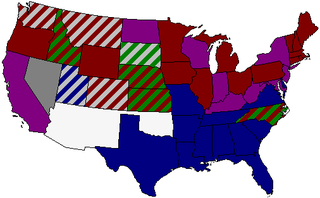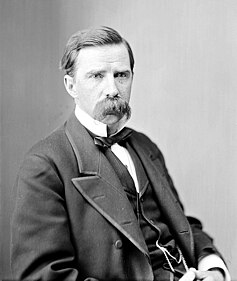
The United States Senate elections of 1908 and 1909, some states elected their senators directly even before passage of the 17th Amendment in 1913. Oregon pioneered direct election and experimented with different measures over several years until it succeeded in 1907. Soon after, Nebraska followed suit and laid the foundation for other states to adopt measures reflecting the people's will. By 1912, as many as 29 states elected senators either as nominees of their party's primary or in conjunction with a general election. The Republicans lost two seats overall.

The United States Senate elections of 1896 and 1897 were elections in which the Democratic Party lost seven seats in the United States Senate, mostly to smaller third parties.
The United States Senate elections of 1860 and 1861 were elections corresponding with Abraham Lincoln's election to the presidency. The nascent Republican Party increased their Senate seats in the general elections, and after southern Democrats withdrew to join the Confederacy, Republicans gained control of the United States Senate. To establish a quorum with fewer members, a lower total seat number was taken into account.

The 1808 United States Senate election in Pennsylvania was held on December 13, 1808. Michael Leib was elected by the Pennsylvania General Assembly to the United States Senate.

The 1820-1821 United States Senate election in Pennsylvania was held on three separate dates from December 1820 to December 1821. On December 10, 1821, William Findlay was elected by the Pennsylvania General Assembly to the United States Senate.

The 1845 United States Senate election in Pennsylvania was held on January 14, 1845. Incumbent Daniel Sturgeon was re-elected by the Pennsylvania General Assembly to the United States Senate.

The 1869 United States Senate election in Pennsylvania was held on January 19, 1869. John Scott was elected by the Pennsylvania General Assembly to the United States Senate.

The 1893 United States Senate election in Pennsylvania was held on January 17, 1893. Incumbent Matthew Quay was re-elected by the Pennsylvania General Assembly to the United States Senate.

The 1901 United States Senate special election in Pennsylvania was held on January 15, 1901, after the regularly scheduled legislative election in January—April 1899 failed to elect a Senator. Former Senator Matthew Quay, who had left the Senate for nearly two years because of the political stalemate, was again elected by the Pennsylvania General Assembly to the United States Senate.

The 1911 United States Senate election in Pennsylvania was held on January 17, 1911. Incumbent George T. Oliver was re-elected by the Pennsylvania General Assembly to the United States Senate. This was the last Class I U.S. Senate election to be decided by the Pennsylvania General Assembly before the ratification of the 17th Amendment to the U.S. Constitution, which mandated direct election of U.S. Senators.

The 1801 United States Senate election in Pennsylvania was held on February 19, 1801. Peter Muhlenberg was elected by the Pennsylvania General Assembly to the United States Senate.

The 1843 United States Senate election in Pennsylvania was held on January 10, 1843. Future President of the United States James Buchanan was re-elected by the Pennsylvania General Assembly to the United States Senate.

The 1849 United States Senate election in Pennsylvania was held on January 10, 1849. James Cooper was elected by the Pennsylvania General Assembly to the United States Senate.

The 1861 United States Senate election in Pennsylvania was held on January 8, 1861. Edgar Cowan was elected by the Pennsylvania General Assembly to the United States Senate.

The 1873 United States Senate election in Pennsylvania was held on January 21, 1873. Simon Cameron was re-elected by the Pennsylvania General Assembly to the United States Senate.

The 1879 United States Senate election in Pennsylvania was held on January 20, 1879. J. Donald Cameron was re-elected by the Pennsylvania General Assembly to the United States Senate.

The 1885 United States Senate election in Pennsylvania was held on January 20, 1885. J. Donald Cameron was re-elected by the Pennsylvania General Assembly to the United States Senate.

The 1891 United States Senate election in Pennsylvania was held on January 20, 1891. J. Donald Cameron was re-elected by the Pennsylvania General Assembly to the United States Senate.

The 1903 United States Senate election in Pennsylvania was held on January 20, 1903. Boies Penrose was re-elected by the Pennsylvania General Assembly to the United States Senate.

The 1909 United States Senate election in Pennsylvania was held on January 19, 1909. Boies Penrose was re-elected by the Pennsylvania General Assembly to the United States Senate. This was the last Class III U.S. Senate election to be decided by the Pennsylvania General Assembly before the ratification of the 17th Amendment to the U.S. Constitution, which mandated direct election of U.S. Senators.








